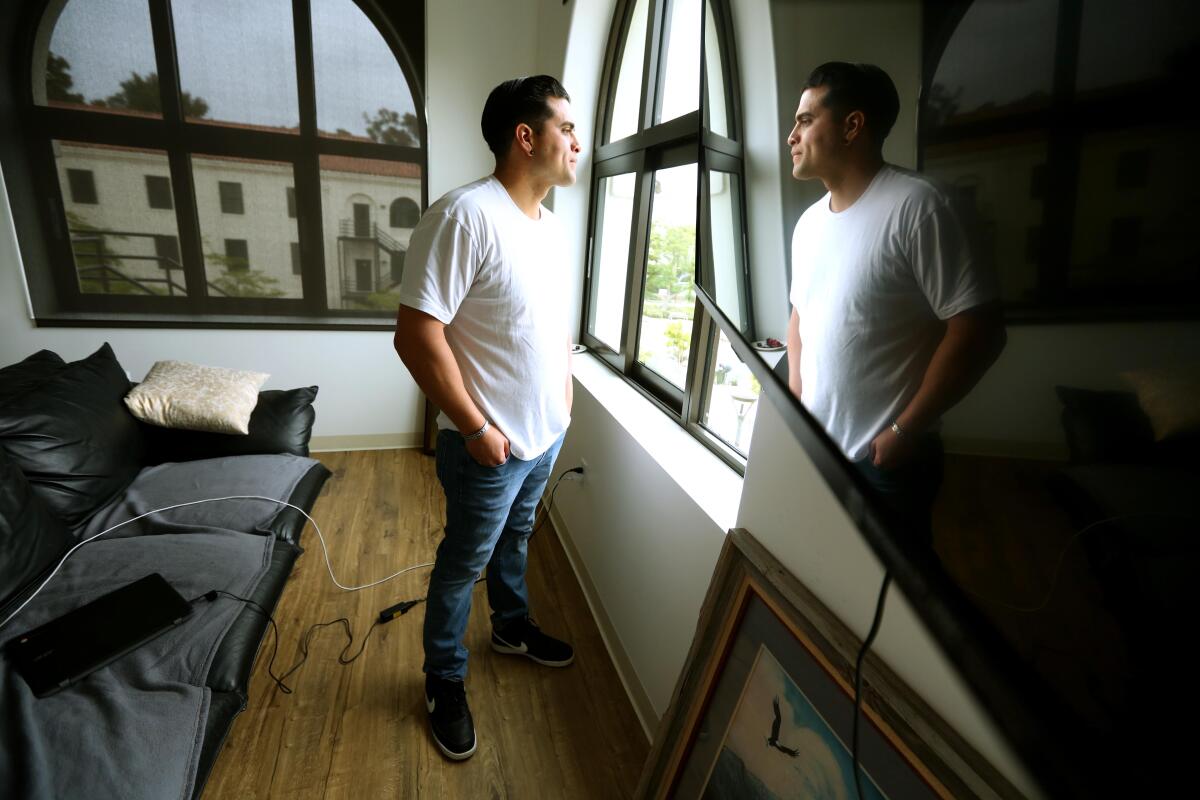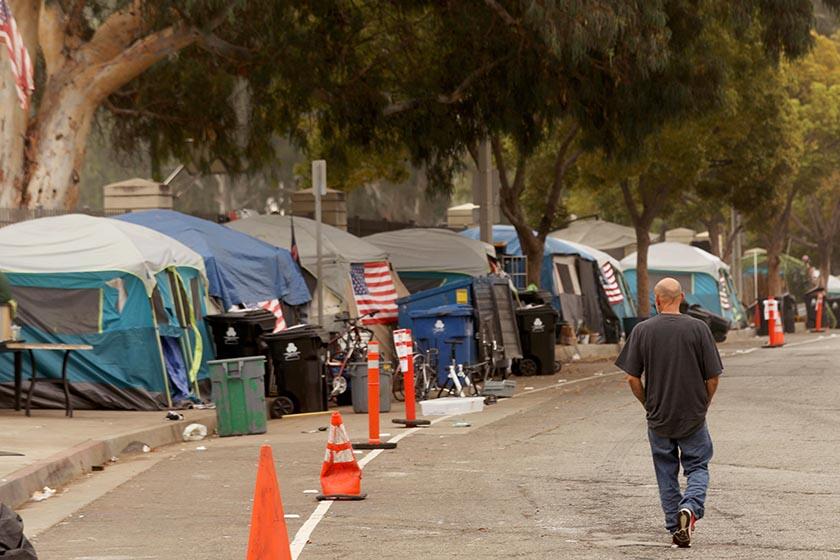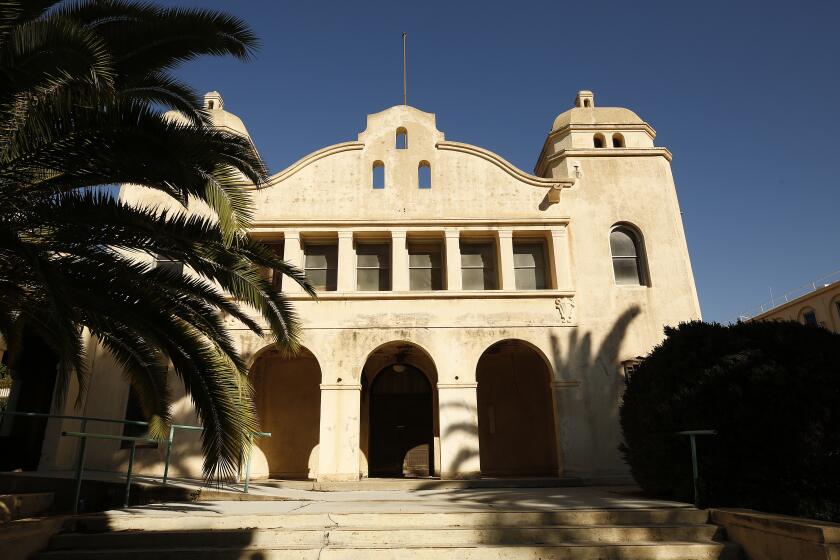Vets must fight bureaucratic war to get promised VA housing in L.A.

- Share via
For seven months Eddie Sotelo trudged from office to office, filling out stacks of forms, pestering officials — all while he was living in a filthy VA shelter with 49 other homeless veterans.
His fighting in Afghanistan left the 36-year-old with post-traumatic stress disorder. Back home in Los Angeles, he became destitute and homeless — and eventually forced to wage a new battle, a bureaucratic slog to get housing that vets were promised.
Los Angeles has more homeless veterans than any city in America, according to a 2022 federal report, with nearly 4,000 men and women who served their country bedding down in homeless shelters, in old cars and RVs, under freeway underpasses. The fight to build supportive housing on the verdant, 388-acre West L.A. Department of Veterans Affairs campus — which was granted to the government specifically to house veterans — has spanned 12 years, two lawsuits, and two acts of Congress. By 2022, the VA was supposed to have provided 770 housing units; so far, it has provided only 233. (The VA said the original timeline “created unrealistic expectations.”)
Getting into one of those precious few units requires homeless veterans, many of whom have serious mental health and addiction challenges, to run a months-long gantlet of paperwork and office visits that would test anyone’s resolve.
And as Sotelo found out, the gantlet comes with a twist straight out of Kafka: The disability payments veterans receive for injuries they suffered in service to their country can actually render them ineligible for the VA’s new housing.
Sotelo is, by nature, an upbeat soul, sporting a cheerful smile everywhere he goes — and that positive demeanor helped drive him through the process.
A lawsuit filed on behalf of homeless veterans demands that Veterans Affairs provide more permanent housing in and around its West L.A. campus.
He grew up in Whittier and served in the Army from 2007 until 2011. His discharge documents show he served in Afghanistan and received extra pay for service in an “imminent danger” area.
Beyond the barest facts — there was a convoy, people were injured — he talks little about what happened in Afghanistan. Remembering makes his PTSD flare up, he says. He receives disability pay for that.
The other subject he won’t delve into is how his life spiraled when he got back home. He struggled with reentering civilian life and providing for his wife and children. He lost his family, his PTSD intensified, he drank more and more, and he alternated between couch-surfing with friends and sleeping on the street.
In October, he wound up in a VA program in Long Beach, designed to help veterans with combat PTSD. He got sober, he said, and had a “spiritual awakening.” On his last day in the program, with nowhere but the streets to return to, he went to the VA in West L.A., which was hosting an annual outdoor fair at which dozens of organizations come together to help homeless veterans get housing, substance abuse treatment, clothing, food and other assistance.
As he walked toward the event, he recalled, anxiety reared up. Crowds triggered his PTSD. He wanted to flee. But if he left, he knew he would spend that night on the streets. So he took breaks, visiting a few booths, then retreating to the fringes to quell the nerves, then going to a few more, retreating again. He said he managed to visit every single booth to inquire about housing — and that very afternoon he moved into the A Bridge Home program on the West L.A. campus.
A Bridge Home, which has had problems for years, is what the VA calls “transitional housing.” On the West L.A. campus, it operates a cavernous tent, where 50 veterans, most with mental health and addiction issues, sleep in cubicles with hip-high walls and no privacy. For Sotelo and many others with PTSD, that meant a constant, in-the-throat anxiety.
Worse, Sotelo recalled, the floor was littered with trash and smeared with mud. There were only three toilets for the 50 men, he said, and one or more was frequently clogged and overflowing.
In response to questions from The Times, the VA said that “heavy rains, coupled with the temporary nature of the tent-like membrane structures, resulted in some water damage, and the extreme weather conditions resulted in mud and debris being tracked inside.”
It said that common areas and bathrooms “are routinely surveyed and cleaned by the janitorial staff; however, the bunks are the Veterans’ responsibility to be cleaned and kept sanitary.”
Sotelo — honored by the Army with an Afghanistan campaign medal, a campaign star, and a good conduct medal — would live in this tent for seven months, trying every day to find permanent housing.
Sotelo found case managers who worked with the A Bridge Home program. But they didn’t seem to know how to get him housing, he said. (The VA said that the contractor that operates A Bridge Home “is experiencing a staffing shortage and a high turnover rate amongst staff” and that the VA “is in talks with the operator to identify strategies to increase staffing.”)
Sotelo started “networking,” as he puts it, talking up vets and advocates and anyone who would listen to help him navigate the bureaucracy. In December, he found Rebecca Ricci, a program director at Village for Vets, a nonprofit that helps homeless veterans. “Eddie immediately stood out to me,” she said. “He just had all of his ducks in a row, all of his paperwork done and took care of business. I was just really impressed by his commitment to his sobriety and getting housed.”
Yet even for Sotelo, a model client, it would take another five months to secure housing, he and Ricci said. The ordeal is a blur of countless trips to fluorescent-lighted offices with endless packets of forms and paperwork to fill out.
The VA is finally making progress on building housing on its West L.A. campus for homeless veterans, but it could still go faster.
For a vet to get supportive housing on the West L.A. campus, they must be screened to determine if they are eligible for housing. Then they have to apply to the company that manages the housing. If the company approves them, they can apply for a federal housing voucher. Even one incorrect or missing detail on the application can force veterans to redo the paperwork, often adding on months, say advocates who help veterans through the process.
Once all the paperwork is in order, the veteran is assigned to a particular apartment — but cannot move in, because those units are funded by other government agencies, such as the public housing authorities for the city and county of Los Angeles. To satisfy those entities, the veteran needs to sign a raft of affidavits attesting to most of what was already in their voucher application — immigration status, criminal record, income, taxes, and assets — plus myriad releases allowing the local agency to verify all that information.
Then there are the actual apartments, most of which still aren’t built out — Sotelo was assigned an apartment that took months to finish. When the units are finally ready, an inspector needs to sign off that they’re up to code.
“There’s a lot of steps, a lot of barriers, a lot of red tape, and it’s just — the process is very convoluted,” said Rob Reynolds, a veteran advocate. “We’re dealing with people that are in a very vulnerable state and a fragile state that have a lot of issues going on, whether it be physical or mental disabilities.”
The VA said it’s working to streamline the process, which it acknowledges can be “lengthy,” “cumbersome,” and “arduous.”
Beyond the whirl of offices and forms, Sotelo remembers waiting. He thought he’d get housed in March. Then April. But they kept saying no, not yet. He remembers feeling worn out, as if at the end of a race, but one where you can’t stop, no matter how tired you feel. The stress, he said, brought him perilously close to drinking again.
Near the end of his journey, when Sotelo had been called back in to sign still more paperwork, an older veteran walked into the office, asking for an apartment. He said he had come up from Temecula, Sotello recalled, and had already been to one office, where they couldn’t help him. Staffers told him they could offer him temporary accomodations, like the shelter Sotelo had been living in. But an apartment? That would take months. “He’s like, ‘I already served. I’m homeless. I’m eating out of the trash can,’” Sotelo recalled, raising his voice as the veteran had. “They said, ‘Sir, that’s not how it works. You have to go through the process.’ I see that all the time — getting denied or sent somewhere else.”
That older man reminded Sotelo of many of the veterans who lived in the tent with him, he said, people whose mental health and addiction challenges make it much harder for them to hack their way through the red tape.
“Some of my PTSD has to do with people being injured in the convoy that I was in, so I know what survivor’s guilt is,” Sotelo said. “So coming back here and then seeing my friends dying of alcoholism or drug addiction, and I knew that they could have gotten help at the VA.”
On May 2, Sotelo stood under a big white tent and watched as Mayor Karen Bass, Rep. Ted Lieu (D-Torrance), and Secretary of Veterans Affairs Denis McDonough celebrated the grand opening of two new supportive housing buildings on the West L.A. campus. After the string of speeches, the officials gathered to cut a bright red ceremonial ribbon before leading people inside for guided tours.
Sotelo didn’t need a tour. The day before, he had finally moved into one of the new apartments. It was “a surreal, out of body experience,” he said. The apartment overlooks eucalyptus trees, has its own kitchen, a television, and a bedroom just for him.
But to remain there, he had to overcome a final challenge. The VA’s new supportive housing units on the West L.A. campus come with income caps, meaning a person living in them can only make so much money. Sotelo receives disability payments that total enough to bar him from many of the new units on the campus.
In fact, the more disabled a veteran is, the higher their disability payments are, which leads to a perverse irony: The more grievous the wounds a veteran incurred serving their country, the less likely they are to qualify for housing.
These rules are “in stark contrast to VA’s philosophy of increased benefits with increased disability,” the VA said in its response to The Times, and it has been working with federal, state, and local governments to change them.
For older veterans, Social Security payments add to their income, making it even harder for them to get housed.
In the VA’s new housing on the West L.A. campus, a variety of rules govern the units. Even in the same building, different apartments can have different income caps. Sotelo managed to find a unit with a high enough cap to let him in.
Sotelo’s lease ends next year, and already he’s anxious about what will happen then. If he gets work, even at minimum wage, or if the VA raises his disability pay, he could be forced out.
“Going to Afghanistan, that was supposed to be the last battle for me,” he said. “That’s not the last battle.”
This article was reported and edited in conjunction with the investigative journalism program at USC. The reporter may be contacted at murrayg@usc.edu.
More to Read
Sign up for Essential California
The most important California stories and recommendations in your inbox every morning.
You may occasionally receive promotional content from the Los Angeles Times.














